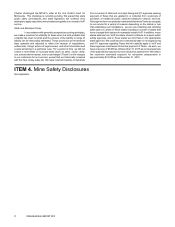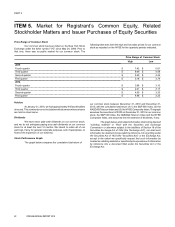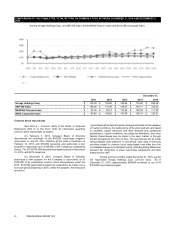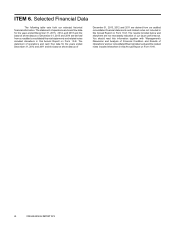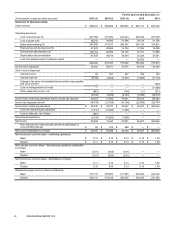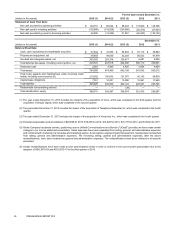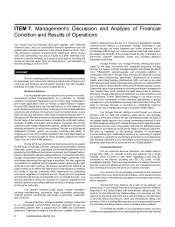Vonage 2015 Annual Report Download - page 23
Download and view the complete annual report
Please find page 23 of the 2015 Vonage annual report below. You can navigate through the pages in the report by either clicking on the pages listed below, or by using the keyword search tool below to find specific information within the annual report.
17 VONAGE ANNUAL REPORT 2015
to be financially insecure. As a significant portion of payments to us are
made through Visa and MasterCard credit cards, if the credit card
processor does not assist in transitioning our business to another credit
card processor, the negative impact on our liquidity likely would be
significant. There were no cash reserves and cash-collateralized letters
of credit with any credit card processors as of December 31, 2015.
We have incurred cumulative losses since our inception and may
not achieve consistent profitability in the future.
While we achieved net income attributable to Vonage of
$22,655 for the year ended December 31, 2015, our accumulated deficit
is $655,020 from our inception through December 31, 2015, which
included the release of $325,601 of the valuation allowance recorded
against our net deferred tax assets that we recorded as a one-time non-
cash income tax benefit for the year ended December 31, 2011. Although
we believe we will achieve consistent profitability in the future, we
ultimately may not be successful. We believe that our ability to achieve
consistent profitability will depend, among other factors, on our ability
to continue to achieve and maintain substantive operational
improvements and structural cost reductions while maintaining and
growing our net revenues. In addition, certain of the costs of our
business are not within our control and may increase. For example, we
and other telecommunications providers are subject to regulatory
termination charges imposed by regulatory authorities in countries to
which customers make calls, such as India where regulatory authorities
have been petitioned by local providers to consider termination rate
increases. As we attract additional international long distance callers,
we will be more affected by these increases to the extent that we are
unable to offset such costs by passing through price increases to
customers.
We may be unable to fully realize the benefits of our net operating
loss (“NOL”) carry forwards if an ownership change occurs.
If we were to experience a “change in ownership” under
Section 382 of the Internal Revenue Code (“Section 382”), the NOL
carry forward limitations under Section 382 would impose an annual
limit on the amount of the future taxable income that may be offset by
our NOL generated prior to the change in ownership. If a change in
ownership were to occur, we may be unable to use a significant portion
of our NOL to offset future taxable income. In general, a change in
ownership occurs when, as of any testing date, there has been a
cumulative change in the stock ownership of the corporation held by
5% stockholders of more than 50 percentage points over an applicable
three-year period. For these purposes, a 5% stockholder is generally
any person or group of persons that at any time during an applicable
three-year period has owned 5% or more of our outstanding common
stock. In addition, persons who own less than 5% of the outstanding
common stock are grouped together as one or more “public group” 5%
stockholders. Under Section 382, stock ownership would be determined
under complex attribution rules and generally includes shares held
directly, indirectly (though intervening entities), and constructively (by
certain related parties and certain unrelated parties acting as a group).
We have implemented a Tax Benefits Preservation Plan intended to
provide a meaningful deterrent effect against acquisitions that could
cause a change in ownership, however this is not a guarantee against
such a change in ownership.
Jeffrey A. Citron, our founder, non-executive Chairman, and a
significant stockholder, exerts significant influence over us.
As of December 31, 2015, Mr. Citron beneficially owned
approximately 9.8% of our outstanding common stock, including
outstanding securities exercisable for common stock within 60 days of
such date. As a result, Mr. Citron is able to exert significant influence
over all matters presented to our stockholders for approval, including
election and removal of our directors and change of control transactions.
In addition, as our non-executive Chairman, Mr. Citron has and will
continue to have influence over our strategy and other matters as a
board member. Mr. Citron’s interests may not always coincide with the
interests of other holders of our common stock.
Our certificate of incorporation and bylaws, the agreements
governing our indebtedness, and the terms of certain settlement
agreements to which we are a party contain provisions that could
delay or discourage a takeover attempt, which could prevent the
completion of a transaction in which our stockholders could
receive a substantial premium over the then-current market price
for their shares.
Certain provisions of our restated certificate of incorporation
and our second amended and restated bylaws may make it more difficult
for, or have the effect of discouraging, a third party from acquiring control
of us or changing our board of directors and management. These
provisions:
> permit our board of directors to issue additional
shares of common stock and preferred stock and
to establish the number of shares, series
designation, voting powers (if any), preferences,
other special rights, qualifications, limitations or
restrictions of any series of preferred stock;
> limit the ability of stockholders to amend our
restated certificate of incorporation and second
amended and restated bylaws, including
supermajority requirements;
> allow only our board of directors, Chairman of the
board of directors or Chief Executive Officer to call
special meetings of our stockholders;
> eliminate the ability of stockholders to act by written
consent;
> require advance notice for stockholder proposals
and director nominations;
> limit the removal of directors and the filling of
director vacancies; and
> establish a classified board of directors with
staggered three-year terms.
In addition, a change of control would constitute an event of
default under our 2015 Credit Facility. Upon the occurrence of an event
of default, the lenders could elect to declare due and payable
immediately all amounts due under our 2015 Credit Facility, including
principal and accrued interest, and may take action to foreclose upon
the collateral securing the indebtedness.
Under our 2015 Credit Facility, a “change of control” would
result from the occurrence of, among other things, the acquisition by
any person or group (other than Mr. Citron and his majority-controlled
affiliates) of 35% or more of the voting and/or economic interest of our
outstanding common stock on a fully-diluted basis.
Such provisions could have the effect of depriving
stockholders of an opportunity to sell their shares at a premium over
prevailing market prices. Any delay or prevention of, or significant
payments required to be made upon, a change of control transaction or
changes in our board of directors or management could deter potential
acquirors or prevent the completion of a transaction in which our
stockholders could receive a substantial premium over the then-current
market price for their shares.
ITEM 1B. Unresolved Staff Comments
















